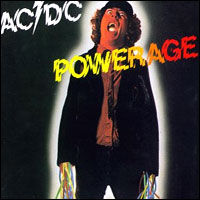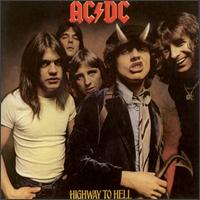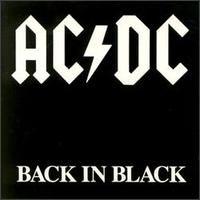|
Music Reviews
Alternative
Blues
Books
Christmas
Classic Rock
Country
Jazz
Lounge
Oldies
Power Pop
Punk & New Wave
Reggae
Rhythm & Blues
Seventies
Texas
Special Features
Randy's Rodeo
Sex Pistols
Motown
Halloween
Valentine's Day
Information
About Me
Feedback
Links
User's Guide
Support Me
Amazon
iTunes
Sheet Music Plus
|
Sock it to me, Santa! Visit my other website, www.hipchristmas.com Visit my other website, www.hipchristmas.com
 What
better artist with which to start a discussion of rock & roll than AC/DC?
Because, you see, rock & roll reached its apotheosis with AC/DC's Back
In Black. Every single song was about (violent) sex or (excessive) drugs
or (fucking loud) rock & roll (or all three at the same time). Every single
one. And the band's style - lumbering, abrasive, pointedly stupid - distilled
rock's basic purpose (to annoy your parents) to its ear-splitting essence. Picking
the highlights of Back
In Black is nearly impossible, but the orgiastic "You Shook Me All Night
Long," the skull-shattering title track, and the anthem-to-end-all-anthems, "Rock & Roll
Ain't Noise Pollution," show clearly how great this album is. Years after
its release, rockers of all stripes - metal, punk, goth - still genuflect before Back
In Black. Rappers even sample it. What
better artist with which to start a discussion of rock & roll than AC/DC?
Because, you see, rock & roll reached its apotheosis with AC/DC's Back
In Black. Every single song was about (violent) sex or (excessive) drugs
or (fucking loud) rock & roll (or all three at the same time). Every single
one. And the band's style - lumbering, abrasive, pointedly stupid - distilled
rock's basic purpose (to annoy your parents) to its ear-splitting essence. Picking
the highlights of Back
In Black is nearly impossible, but the orgiastic "You Shook Me All Night
Long," the skull-shattering title track, and the anthem-to-end-all-anthems, "Rock & Roll
Ain't Noise Pollution," show clearly how great this album is. Years after
its release, rockers of all stripes - metal, punk, goth - still genuflect before Back
In Black. Rappers even sample it.
The music of AC/DC, however, hardly began with Back
In Black - though, for all intents and purposes, it ends there. There is,
in fact, quite a story leading up to that point. AC/DC was founded in 1973
by Australian brothers Angus and Malcolm Young, and their early records were
produced by elder sibling George Young and his partner, Harry Vanda.
(Vanda and Young had been the core of the Easybeats and would later record
as Flash And The Pan.) Guitarist Angus Young became the AC/DC's focal point,
dressing in schoolboy short pants and running hyperactively about the stage
as he played his fearsome licks. But it was lead singer Bon Scott - a true
rock 'n' roll wild man - who was the soul of the band. The records Scott cut
with AC/DC are considered by many fans to be the band's best work.
 Back
In Black notwithstanding, all of AC/DC's early records are pretty damn
good, completely worthy in their own right. Their first two records, High
Voltage (1974) and T.N.T. (1975), were released
only in Australia; the best tracks from both albums were combined in 1976 as High
Voltage (with a new cover) for the band's first release in the rest of the world. Critics hated it with an impressive unanimity, and AC/DC's next album, Dirty
Deeds Done Dirt Cheap (1976), wasn't even released outside Australia. Still, Let
There Be Rock (1977) received release worldwide with one added track ("Problem
Child" from Dirty
Deeds) and different cover art. It squeaked onto the Billboard album charts at #154 thanks to the band's relentless, riot-inducing touring. Back
In Black notwithstanding, all of AC/DC's early records are pretty damn
good, completely worthy in their own right. Their first two records, High
Voltage (1974) and T.N.T. (1975), were released
only in Australia; the best tracks from both albums were combined in 1976 as High
Voltage (with a new cover) for the band's first release in the rest of the world. Critics hated it with an impressive unanimity, and AC/DC's next album, Dirty
Deeds Done Dirt Cheap (1976), wasn't even released outside Australia. Still, Let
There Be Rock (1977) received release worldwide with one added track ("Problem
Child" from Dirty
Deeds) and different cover art. It squeaked onto the Billboard album charts at #154 thanks to the band's relentless, riot-inducing touring.
Powerage (1978) was the band's first album to be released simultaneously in all markets, followed closely by the inevitable live document If
You Want Blood (1978). Each record sold more than the previous, and with each one the band moved closer
to the jet engine roar that would soon characterize their best work.
Dirty
Deeds, by the way, was finally released worldwide in 1981, and it's an excellent place to start collecting
if you are watching your pennies. Like its Aussie counterpart, this edition of Dirty
Deeds contains a wealth of metallic treasures: the whimsical title track; Angus Young's emblematic "Problem Child"; "Big Balls" (insert
smirking comment here); and the inexorable "Ride On," which foreshadowed
the elephantine arrangements that characterize AC/DC's later work. The 1981 edition of Dirty
Deeds also includes the otherwise non-LP 1977 single "Love At First Feel" and the anthemic "Rocker" from T.N.T. (An EP called '74
Jailbreak was cobbled together from High
Voltage and Dirty
Deeds leftovers in 1984.)
Bon Scott's masterwork and swan song, then, was 1979's Highway
To Hell, which broke AC/DC into Billboard's Top 20. Featuring Scott's horny masterwork "The Girl's Got Rhythm," the foreboding, prescient "If You Want Blood (You Got It)," and the fist-raising title track (a minor hit single), Highway
To Hell was a fierce, defiant statement from a man about to hit the wall.
When he did (dead in 1980 at age 33 from massive alcohol abuse), AC/DC seemed
done for. Happily, such was not the case, and the aforementioned Back
In Black - itself a tribute to Scott - became an instant and lasting
hard rock classic.
 The
band's new vocalist, Brian Johnson, didn't have the puckish personality of
Bon Scott, but he possessed a truly amazing set of pipes capable of shredding
melodies with pinpoint accuracy. Johnson's singing (more like white noise with
words, really) combined with the studio acumen of producer Mutt Lange
pushed AC/DC over the top into heavy metal Valhalla. Back
In Black became the biggest hit the band would ever have, and it established
a benchmark against which hard rock bands are measured to this day. But AC/DC
would (very nearly) sustain such giddy heights for just one more record, the
cataclysmic For
Those About To Rock. As good as the album is, you can hear the inspiration turning
into formula, and subsequent releases simply repeated the formula
- with diminishing returns each time out of the gate. Of course the faithful
will want 'em all, but as for me and my house, we'll to stick to the hard stuff: For
Those About To Rock, and no further. The
band's new vocalist, Brian Johnson, didn't have the puckish personality of
Bon Scott, but he possessed a truly amazing set of pipes capable of shredding
melodies with pinpoint accuracy. Johnson's singing (more like white noise with
words, really) combined with the studio acumen of producer Mutt Lange
pushed AC/DC over the top into heavy metal Valhalla. Back
In Black became the biggest hit the band would ever have, and it established
a benchmark against which hard rock bands are measured to this day. But AC/DC
would (very nearly) sustain such giddy heights for just one more record, the
cataclysmic For
Those About To Rock. As good as the album is, you can hear the inspiration turning
into formula, and subsequent releases simply repeated the formula
- with diminishing returns each time out of the gate. Of course the faithful
will want 'em all, but as for me and my house, we'll to stick to the hard stuff: For
Those About To Rock, and no further.
As of this writing, no AC/DC "greatest hits" package has ever been
released (barring the half-hearted Who
Made Who soundtrack). A well-chosen anthology or exhaustive boxed set would
be altogether welcome. As long as we keep scooping up the albums, however,
I suspect the band will be reticent to do comply. For now, I can only give
a qualified recommendation to the Bon Scott tribute Bonfire;
its four CD's (two live, one with outtakes, plus Back
In Black) will appeal mainly to hardcore Scott acolytes. Rather, I recommend
AC/DC's first seven American full-length, studio albums - all brilliantly remastered and
smartly repackaged. Buy them, and I'll salute you.
Release Notes. As mentioned, AC/DC's first four albums were issued
in their native Australia by Albert Records in versions that varied - sometimes
dramatically - from
the later American versions on Atlantic Records. The Oz editions had different
tracks, or different covers, or both. One album, TNT,
was never issued in the U.S. at
all - though most tracks appeared in some form somewhere. Be aware that for
American fans the Australian versions can be tough and expensive to track down.
Visit
Albert Records' website to
learn more (and check out their 17-CD
boxed set),
but there's an easier solution: pick up Sony's superlative 2003
remasters of the U.S. albums, and stop worrying
about it. [top of page]
 Selected AC/DC Albums Selected AC/DC Albums
[top of page]
 Essential AC/DC Songs Essential AC/DC Songs
- Back In Black (1980)
-
Big Balls (1976)
-
C.O.D. (Care Of The Devil) (1981)
-
Dirty Deeds Done Dirt Cheap (1976)
-
Evil Walks (1981)
-
For Those About To Rock (We Salute You) (1981)
-
The Girl's Got Rhythm (1979)
-
Given The Dog A Bone (1980)
-
Have A Drink On Me (1980)
-
Hells Bells (1980)
-
Highway To Hell (1979)
-
If You Want Blood (You Got It) (1979)
-
Inject The Venom (1981)
-
It's A Long Way To The Top (If You Wanna Rock 'n' Roll) (1975)
-
The Jack (1975)
-
Let Me Put My Love Into You (1980)
-
Let There Be Rock (1977)
-
Night Prowler (1979)
-
Problem Child (1976)
-
Put The Finger On You (1981)
-
Ride On (1976)
-
Rock And Roll Ain't Noise Pollution (1980)
-
She's Got Balls (1974)
-
Shoot To Thrill (1980)
-
Sin City (1978)
-
T.N.T. (1975)
-
Up To My Neck In You (1978)
-
Walk All Over You (1979)
-
What Do You Do For Money Honey (1980)
-
Whole Lotta Rosie (1977)
-
You Shook Me All Night Long (1980)
[top of page]
 The AC/DC Bookshelf The AC/DC Bookshelf
[top of page]
 AC/DC On The Web AC/DC On The Web
[top of page]
 Feedback Feedback
Your witty comments, impertinent questions, helpful suggestions, and angry denials
are altogether encouraged. Submit feedback via email;
submissions will be edited and posted at my discretion.
June 5, 2003. You're wrong about AC/DC ending with Back
In Black. They're the best band ever! But that's just a raving fan's opinion.
But, I like the organization of your site. It's plain and simple. Your reviews
are well thought out and you make sense. Keep up the good work. Let There Be
Rock! - Blak Hauk
|
|